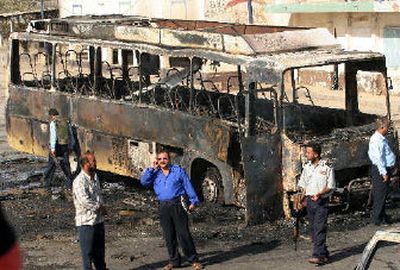Car bombs’ toll mounts to 43

BAGHDAD, Iraq – Three car bombs exploded Wednesday near a crowded bus station and a nearby hospital where survivors were being taken, killing as many as 43 people in the deadliest suicide attack in Baghdad in weeks. Rescuers used bolt cutters to free some victims hurled into barbed wire fences by the blast.
The attacks came as Iraq’s main Sunni party denounced the talks on Iraq’s constitution, raising doubts the document can win Sunni support.
Police said the first bomb blew up at the Nadha bus terminal, the city’s largest, shortly before 8 a.m. as swarms of travelers were boarding buses. As Iraqi police rushed to the scene, a suicide driver detonated his vehicle in the station’s parking lot.
Another suicide bomber blew up his car a half-hour later across the street from nearby Kindi Hospital, where ambulances were transporting the injured.
Police Capt. Nabil Abdul-Qader said 43 people were killed and 85 wounded in the attacks.
Terrified survivors – many crying and screaming – scrambled about the smoking, charred hulks of buses and cars looking for signs of relatives. Several weeping men hugged inside the open-air terminal. One man searched through the charred buses for signs of his brother and cousin.
“We want our voices to be heard by the president of the republic and every official to tackle such violence,” shouted one dazed security guard who refused to give his name. “All those who were killed are innocent people. There were no American nor Iraqi troops on the scene.”
Four suspects were detained at the bus station on suspicion of involvement in the bombings, the Transportation Ministry said.
The attacks Wednesday were the deadliest series of single-day suicide bombings in Baghdad since mid-July, although suicide attacks with far lower death tolls occur almost daily.
The latest attacks occurred shortly before the leaders of Iraq’s political factions met to try to finish the constitution by the new deadline Monday. If no agreement can be reached this time, the interim constitution requires that the parliament be dissolved and that a new transitional assembly and government be elected in December.
Some Shiite officials spoke of progress in the Wednesday talks.
However, the largest Sunni group, the Iraqi Islamic Party, issued a blistering attack on the drafting committee, accusing it of bias and incompetence. The party, which has members on the committee, said major differences remain on the same issues that blocked a deal last week.
They included federalism, the role of the Shiite clergy and the distribution of Iraq’s vast oil wealth. The Sunni party also insisted that the new constitution affirm the country’s Arab and Islamic identity and demanded that Islam be declared a main source in legislation – a measure opposed by Kurds and women’s activists.
“The battle of the constitution is not over yet,” the Sunni party said. “Our people should be awake and cautious and the popular will should arise to put pressure for a free Iraqi national draft constitution that preserves the sovereignty and unity of its people.”
The Sunni group’s statement raised serious questions about the constitution, and if it can achieve a major U.S. objective of luring disaffected Sunni Arabs away from the Sunni-dominated insurgency.
Once the draft is approved by parliament, it will be submitted to the voters in a referendum Oct. 15. If two-thirds of the voters in three of the 18 provinces reject the constitution, it will be defeated. Sunnis form the majority in at least four provinces.